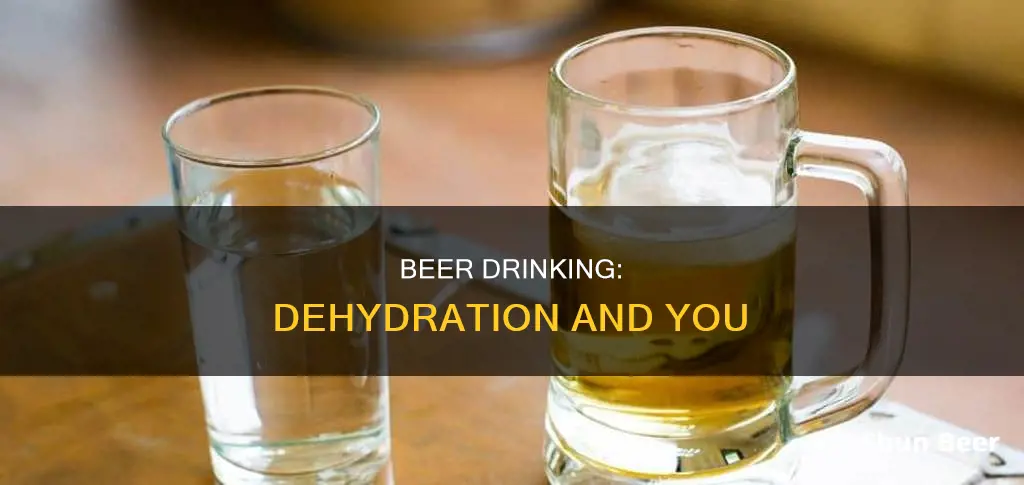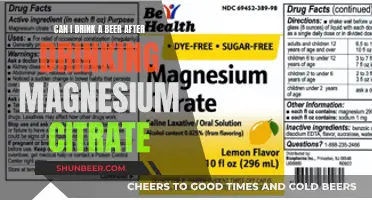
Beer is a diuretic, which means drinking it will make you urinate more. This can lead to dehydration, as your body loses more water than it takes in. However, the non-alcoholic fluids in beer are hydrating, so it's a question of whether the hydrating properties outweigh the diuretic effect.
Most beers today are over 5% ABV, which means they are likely to be dehydrating. However, some studies have found that a beer with an ABV of around 2% can be just as hydrating as water.
| Characteristics | Values |
|---|---|
| Can beer hydrate you? | Beer with a very low alcohol content can hydrate you. |
| Alcohol content in beer | Most beers today are above 5% ABV. |
| Diuretic effect | Alcohol is a diuretic, which increases urine output. |
| Dehydration | Alcohol can cause dehydration by increasing urine output and interfering with mechanisms that regulate water in the body. |
| Rehydration | Drinking water between alcoholic drinks can help with rehydration but will not completely prevent dehydration. |
| Historical usage | Beer was consumed instead of water in ancient times due to sanitation concerns, but this practice is not supported by medieval historical evidence. |
What You'll Learn

Beer is a diuretic
The alcohol content of a beer determines its diuretic effect. Beers with a higher alcohol content will be more dehydrating. Most beers today are above 5% ABV, which is why they are questionable in terms of hydration. However, very low alcohol beers (less than 4% ABV) can hydrate you.
A study published in The Journal of Applied Physiology found that beverages with low alcohol concentrations have a negligible diuretic effect when consumed during exercise-induced dehydration. This means that hydrating with water or a low-alcohol beer (around 2% ABV) is effectively the same.
In ancient times, beer was safer to drink than water, as the brewing process killed bacteria. Beer was also used for hydration alongside water. However, the beer consumed in ancient times was much lower in alcohol content than the beer available today.
Beer and Driving: Is One Beer Too Many?
You may want to see also

Alcohol inhibits the release of vasopressin
When alcohol is consumed, it increases the ratio of fluid to particles in the blood, which stimulates the kidneys to release more urine. Alcohol also suppresses the release of vasopressin, which further increases urine output.
The diuretic effect of alcohol is influenced by the concentration of alcohol in a drink. For example, a study found that urine output increased when the alcohol content of a drink was increased from 2% to 4%.
The diuretic effect of alcohol may also be influenced by an individual's hydration status before drinking. One study found that people who were slightly dehydrated before drinking alcohol urinated less than those who were hydrated, even when consuming the same amount of alcohol.
Additionally, the diuretic effects of alcohol may be reduced in individuals who are chronically dehydrated. This could be because the body attempts to restore fluid balance when in a state of water deficit.
Watermelon, Beer, and Death: A Curious Combination
You may want to see also

Beer can be hydrating if ABV is low enough
Beer is 95% water, so it stands to reason that it should hydrate you. However, the remaining 5% is mostly alcohol, which is a diuretic and therefore dehydrating. So, does beer hydrate or dehydrate you?
Well, it depends on the alcohol content. Most beers available today are above 5% ABV, which is why they are considered dehydrating. However, very low alcohol beers (below 4% ABV) can hydrate you, and for centuries, beer was used for hydration alongside water.
A study published in The Journal of Applied Physiology found that beverages with low alcohol concentrations have a negligible diuretic effect when consumed in a state of exercise-induced dehydration. This means that hydrating with water or a low-alcohol beer (around 2% ABV) is effectively the same. The study also found that a 4% ABV beer had the same hydrating qualities but took longer to achieve the same results.
So, if you're looking to quench your thirst after a sweaty workout or a day in the sun, a low-alcohol beer can do the trick! Just be mindful of how much you're drinking, as consuming too much can still lead to dehydration.
It's worth noting that while beer can provide hydration, it's not as effective as drinking water or beverages that contain electrolytes. Water is still the best way to hydrate your body and prevent dehydration.
Beer and Hyoscyamine: A Safe Mix?
You may want to see also

Beer is 95% water
Beer is mostly water. In fact, water makes up 90 to 95% of beer's content. The mineral content of water can be manipulated and adjusted according to the requirements of the beer style being brewed.
The average brewhouse uses seven gallons of water to produce one gallon of beer. At less efficient breweries, the ratio can go as high as 10 to one. Cleaning uses the most water—three to eight gallons per gallon of beer—and additional water is needed for cooling and packaging.
Beer is not a suitable replacement for water. While it is mostly water, the alcohol in beer has a diuretic effect, causing increased urination and dehydration. However, some studies have found that beer might actually hydrate us adequately. One study found that urine output after drinking a typical beer was no different from that after drinking a non-alcoholic beer or water. Another study found that an electrolyte-filled sports drink was better at hydrating than a strong beer, but a weak beer did not increase urine output more than water.
It is important to note that the lower the alcohol content in a beverage, the less of a diuretic it is. Therefore, beer, which typically has an alcohol content of 3-7%, is the least dehydrating alcoholic drink. However, it is still important to drink water in addition to beer to stay hydrated.
Dogs and Beer: Can It Make Your Pup Sick?
You may want to see also

Beer is more hydrating than wine or spirits
Alcohol is a diuretic, which means it increases urine output. This can have a dehydrating effect on the body. However, when it comes to alcoholic drinks, beer is the least dehydrating option.
Beer typically has an alcohol content of 3-7% per 12-ounce serving, while a 5-ounce glass of wine can contain up to 14% alcohol, and a 1.5-ounce shot of liquor can contain up to 70% alcohol. Therefore, drinking a glass of wine or a shot of liquor will increase your blood alcohol levels more than drinking a beer.
It's important to note that the amount of alcohol consumed also matters. Drinking multiple beers in quick succession can be just as dehydrating as drinking a shot of liquor. To stay hydrated, it's best to drink slowly and alternate alcoholic drinks with water.
Additionally, the type of alcohol matters too. Mixed drinks that contain water, such as vodka soda, may be less dehydrating than straight shots of liquor. This is because they take longer to consume, and the added water may help slow the increase in blood alcohol levels.
While beer may be the least dehydrating alcoholic option, it's important to remember that no alcoholic drink will be truly hydrating. Water is always the best option for hydration.
Is Alcohol-Free Beer Halal?
You may want to see also
Frequently asked questions
Yes, drinking beer can make you dehydrated. Beer is a diuretic, which means it increases urine output. The alcohol in beer suppresses the release of the anti-diuretic hormone vasopressin, which normally prevents excessive urination.
Symptoms of dehydration include feeling weak, dizzy, thirsty, having dry eyes or a dry mouth, and having a headache.
To stay hydrated while drinking beer, it is recommended to alternate between alcohol and water, drinking a glass of water for every alcoholic drink.
Yes, beers with a lower alcohol content are less dehydrating. Non-alcoholic and very low-alcohol beers (3% alcohol) can be hydrating, while beers with higher alcohol content (>4% alcohol) will dehydrate you.







